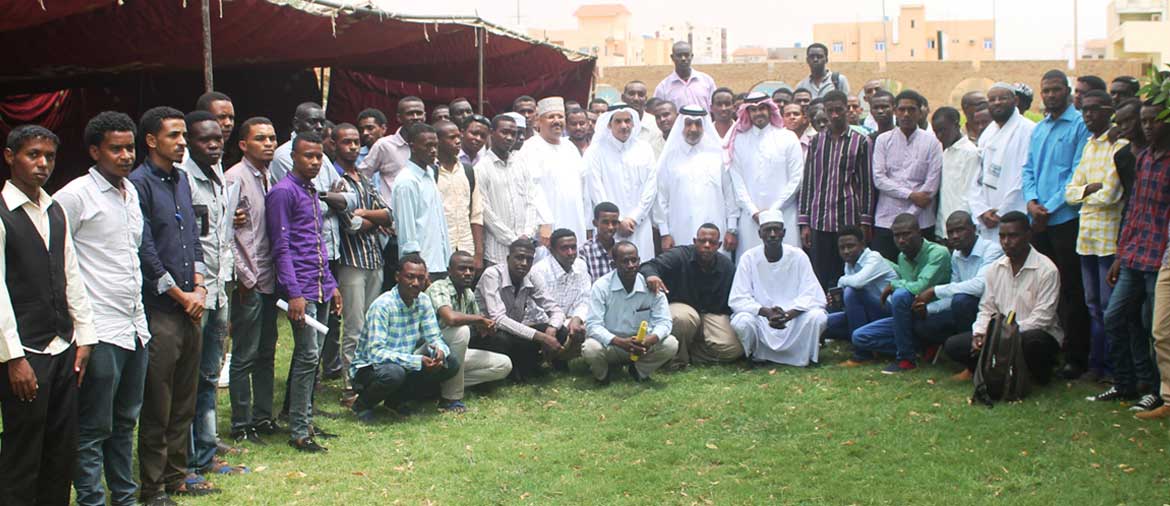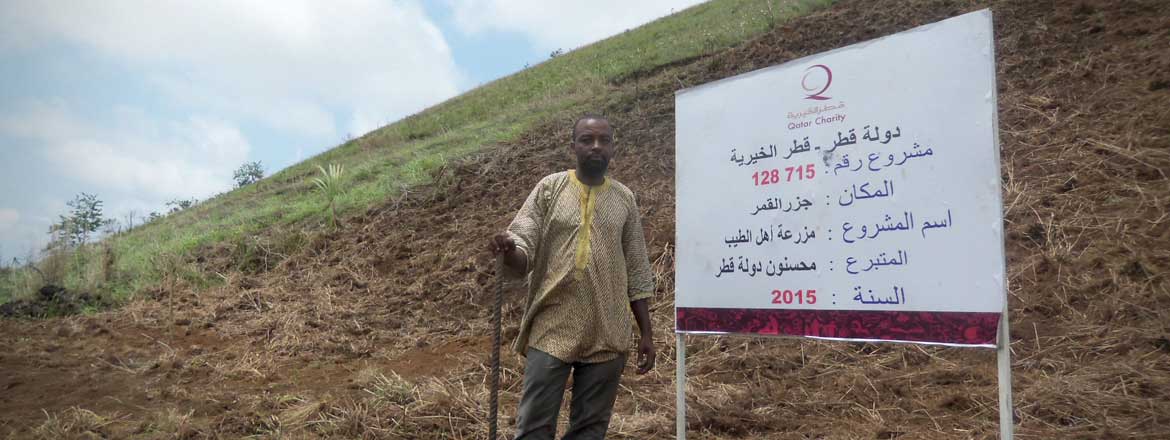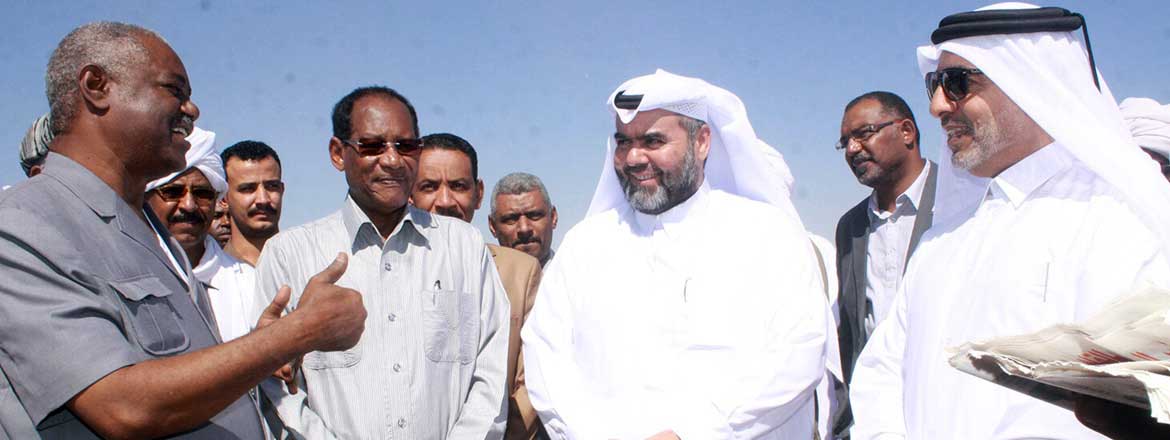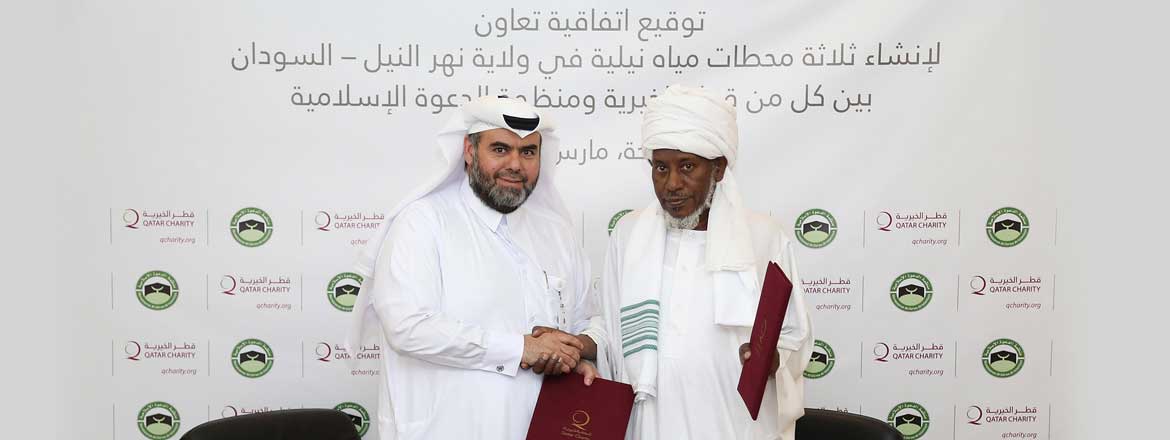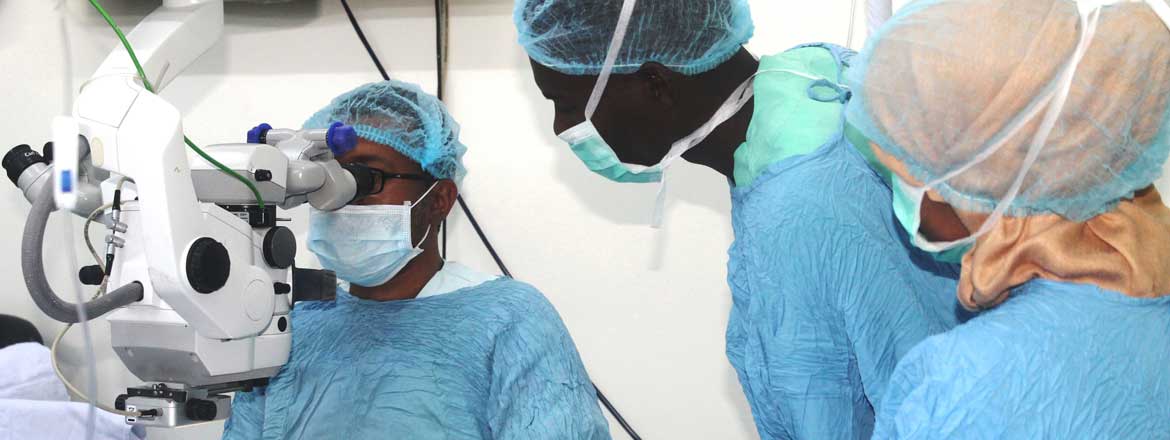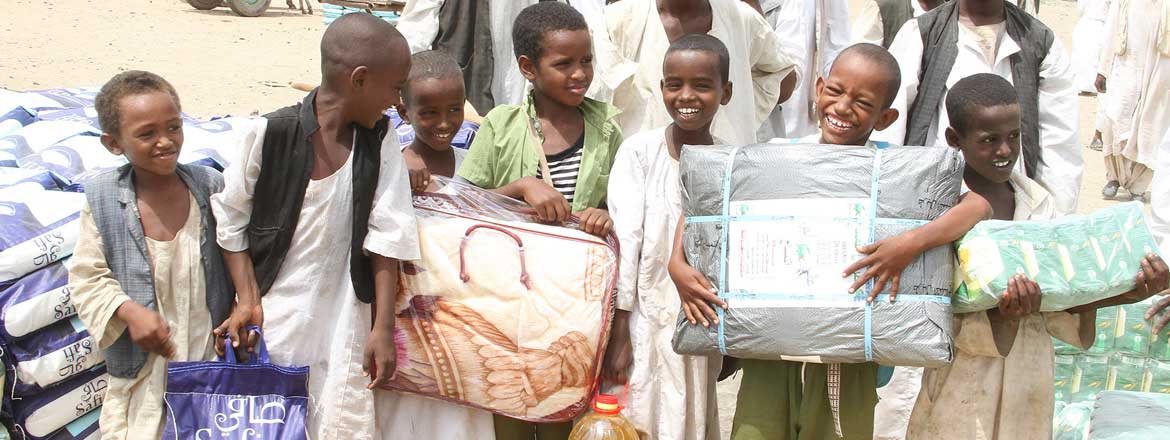Qatar Charity Implements 46 income- generating projects in Sudan
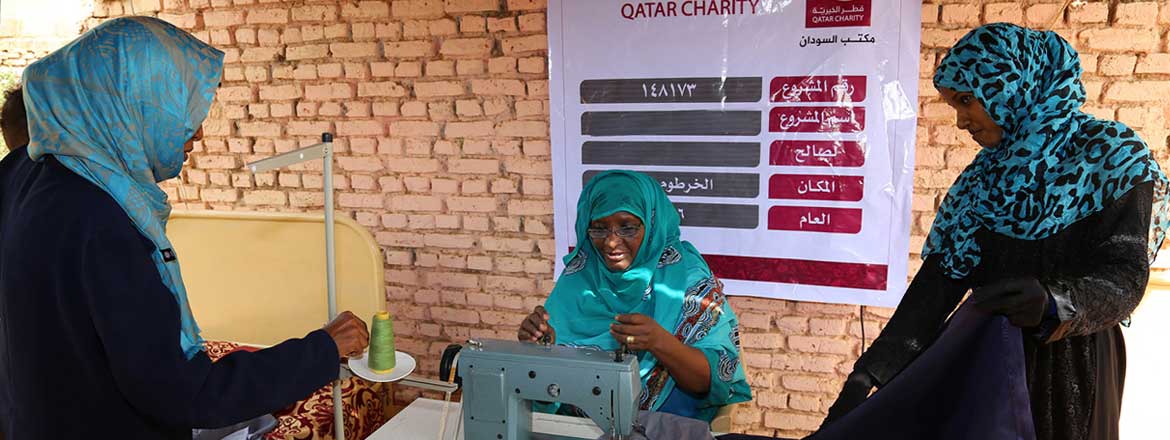
2016-11-22T03:27:59+01:00

To promoting its developmental and humanitarian role in the global areas of intervention, QC implemented 46 income-generating projects in Sudan in favor of more than 322 people during the last months of 2016.
The projects included providing trucks, grain mills and taxis "Rakshah", distributing sewing machines to housewives and implementing poultry and livestock- breeding projects. QC hopes that these projects would bring revenues to enable people to live a decent life.
More than 322 individuals benefited from these projects that amounted to a quarter of a million Qatari Riyals. They were carried out in Khartoum State, Northern State and South Kordofan.
Mr. Hussein Kermash, the Director of QC Office in Sudan said, "The income-generating projects are important as they alleviate the suffering of the poor and low-income people under the conditions of lack of employment. In addition, they encourage these groups to be self-reliant through providing a decent work with constant income."
He assured that QC office in Sudan carried out a feasibility study to ensure the benefit of these projects. The feasibility study revealed that these projects are useful and income generating, and they will improve the living conditions of hundreds of individuals and families. Therefore, QC office in the Sudan have funded them immediately.
Mr. Kermash extended his sincere thanks to the people of Qatar and the residents in Qatar for their ongoing support and donations in favor of the different projects implemented in the Sudan. These projects increase the individuals' productivity and integrate them into the economic life, so that they become productive people who can support the country's economic growth and sustain their families as well.
You can donate to support such projects through the link: Click here
Related News
QC Provides Job Opportunities
Because it always supports the neediest categories and because it always tries to fulfill its duty towards the orphans it sponsors, QC signed a strategic partnership with Hemaya Security Solutions Co. to hire more than 250 orphans of legal age in Sudan. This initiative is considered to be the first of its kind ever to be implemented by a charity organization.
Mr. Rashid Abdurrahman Al-Naimi, Qatar’s Ambassador in Sudan, Mr. Faisal Rashid Al-Fahida, QC’s EDO, and Mr. Falih Hamad Al-Hajri, Chief of Governmental Relations Department at Hemaya, supervised the starting of the interviews.
More than 548 candidates applied for the job. 400 of which were interviewed by Hemaya’s delegate Mr. Falih Ahmed Al-Hajri. The interviews lasted for four consecutive days; then 319 were selected to work for Hemaya. 250 of them were from orphans and 59 of them were from the orphans’ families.
Commendations
Mr. Rashid Abdurrahman Al-Naimi, Qatar’s ambassador in Sudan, praised the cooperation between the Qatari institutions to achieve humanitarian and charitable goals. He said it shows Qatar’s bright side.
Furthermore, Mr. Faisal Rashid Al-Fahida, QC’s EDO, commended the outcome of the partnership between Hemaya Co and QC. Such initiative will result in the enhancement of the conditions of many families.
Mr. Falih Hamad Al-Hajri, Chief of Governmental Relations Department at Hemaya, emphasized on the company’s willingness to expand its partnership and increase the work with QC under the understanding of the responsibilities of the Qatari institutions to make a positive change in people’s lives and to empower them economically.
All of the interviewees expressed their appreciation and gratitude for Qatar and QC for such a good initiative hoping more orphans and poor families would benefit from it.
The EDO said that according to QC’s procedures and regulations, the sponsorship time ends when the orphan becomes of a legal age; 18 and above. However, QC never stops helping them until they are financially independent.
Sponsorship Services
QC offers two kinds of services to the sponsored children. First, it offers individual services such as regularly giving money to the sponsored during the time of sponsorship, and directly supervising the student’s education, health, social behavior and psychology. In addition, it offers in-kind contributions every now and then which help the child such as giving him\her a school bag or Eidya.
Second, it offers a group services which include all the activities QC does for a group of sponsored children at the same time. These services and activities can be cultural, artistic, educational, sport, or entertaining.
Sponsorships differ and depend on the conditions of the orphan. There is the sponsorship of a child living with his family, a child living with a foster family, and a child living in an orphanage. Sponsoring children while living with their families comes first because QC believes in the importance of growing up around one’s family. Family is a healthy environment which supports the child educationally, psychologically, emotionally and socially. Sponsoring children by sending them to foster families comes second. Finally, if the first and second choices are not available, QC sends children to an acknowledged orphanage.
85,000 Orphans
QC is currently sponsoring more than 3,489 orphans in 8 Sudanese states. It provides them with financial and educational support, and offers them cultural and entertaining activities. As part of last year’s campaign “Rofaqa’” (Companions), QC sponsored more than 750 orphans in Sudan. Finally, QC sponsors around 85,000 orphans around the world in more than 40 countries.
QC Supports Agricultural Coope
QC continues to fight unemployment through implementing and supporting income-generating projects, and contributing to the enhancement of food situation in the poor societies. In the Comoros, for example, QC’s office supported one of the agricultural cooperatives there.
The Cooperative is taking place in Azew in the north of Ngazidja Island. Its members include some young farmers and graduates from agricultural institutes. QC’s support was through cultivating and planting a 10-hectare field, planting fruit trees (1,000 banana trees, 6,000 sugarcanes, and 500 pineapple trees), different vegetables and potato.
The equipment was delivered to the cooperative during a ceremony held by QC in the Comoros. Several senior figures attended such as His Excellency Mr. Jaber Nasser Al Na’imi, Chargé d'affaires of Qatar Embassy in Moroni; the Commissioner of the Ministry of Agriculture in the Comoros, some local officials from the North of Ngazidja Island and Mr. Mahfouz Zmirlin, QC’s Office Director there.
In his speech, the Commissioner of the Ministry of Agriculture commended Qatar’s efforts in supporting the people of the Comoros and praised the Qatari charity organizations in general and QC in particular for its distinguished projects. QC has implemented projects to fight unemployment and poverty, to reinforce the youth in the field of agricultural cooperatives, and to enhance the food and economic statuses of the country. He also encouraged QC to implement more agricultural projects.
This project is beneficial in so many ways; it plays a role in enhancing the food situation of the people of the Comoros, it is part of the income-generating projects, it fights diseases caused by malnutrition, it helps the unemployed become more independent, it contributes to the development of the countryside and the local economy, it is expected to contribute to the increase of vegetables and fruits and to provide them in the local market thus increase the poor farmers’ income.
In the Comoros, agriculture is considered to be a conventional occupation. It depends on rainy seasons and is greatly connected to the difficult circumstances. It usually costs a lot which makes the youth give up on it as a profession and go look for a better job opportunity in another country.
In 2012, QC announced the inauguration of 430 income-generation projects through supporting poor families. QC did so through offering benevolent loans to help the people start small economic projects at a cost of 126,800 QR. Furthermore, QC supported and developed the infrastructure of the country’s institutions. At a cost of 876,849,3 QR, QC provided them with a building for official meetings in Moheli, and maintained the road connecting Wanani city with Nioumachoua (17 Km) so as to achieve social communication and encourage tourism.
In the past few years, QC equipped and repaired some of the schools and hospitals on the Comoros at a cost of more than 2,000,000 QR. The projects include 26 primary schools in Moheli which comprises 81 classrooms at a cost of around 1,500,000 QR. In addition, the projects were implemented to maintain 4 medical clinics at a cost of more than 500,000 QR.
It is worth mentioning that QC was the first humanitarian organization to open a field office in Moroni, the Capital of the Comoros, in 2010 in order to be able to supervise the humanitarian and developmental projects it is planning to implement in the coming years.
You can donate to support such projects through the link: Click here
Charity Societies in Qatar Bui
- 20,000 people from 19 villages in Sudan will benefit from the water plant which is being built at a cost of 3,000,000 QR.
- The lab tests showed that the groundwater used in Saqadi can cause cancer which is why the water plant was important to stop the spread of diseases.
- During the inspection visit, it was announced that the water plant will operate in two weeks.
QC has announced that the water plant it is supervising in Nile River state in Sudan will be ready this month. 20,000 people from 19 villages will benefit from it.
The project was funded by Qatar Red Crescent, Islamic Dawah Organization and QC who worked together as partners and paid an equal share for the implementation. The project was implemented at a cost of 3,000,000 QR. QC was responsible for supervising the work progress through its office in Khartoum.
Inspection Visit
A delegation from QC; headed by Mr. Youssef bin Ahmed Al Kuwari, QC’s CEO; paid an inspection visit to Saqadi region in Nile River State where the plant is being built. Mr. Kuwari was accompanied by Mr. Mohammed Hamed Al Billa, River Nile State Wali, and Mr. Rashid bin Abdul Rahman Al Nuaimi, Qatar Ambassador in Sudan.
During the visit, Engineer Al Hadi Adam, Director of Kanana Company, spoke about the work progress of the project and that the plant will start pumping drinking water in two weeks from the visit.
For his part, Mr. Al Nuaimi expressed his happiness that the project was about to be over. “Such developmental projects reinforce the relationships between the Qatari and Sudanese peoples,” said he. In addition, Mr. Al Billa addressed the people living in Saqadi and praised Qatar’s role in relieving those in need, sponsoring orphans, and implementing projects in Sudan. “This water project,” he said, “provides clean drinking water. We thank Qatar’s prince, government, people, and charity organizations who helped build this plant.”
Reasons for the Project
The reason for this project is to contribute to providing drinking water from the Nile River to limit the spread of diseases resulting from drinking polluted water. The lab results have shown that the groundwater the people of Saqadi used to drink from is greatly troubled and has Zink which causes cancer.
The project aims at providing drinking water to 20,000 people by constructing a water plant on the River Nile with water intake, intake pumps and a transporting line to deliver the raw water from the intake to the plant. There is also a main line to transport the water from the plant to 19 villages
The plant has a capacity of 2,000 m3 with a settling basin that has a capacity of 250 m3 and a water tank that has the capacity of 100 m3 and a height of 12 m. The plant also includes a laboratory to test the water, a store for chlorination materials and buildings for the operation and security crews.
Memorandum of Understanding
In order to make sure the plant is entirely built and that it will continue to work, QC; representing itself, Qatar Red Crescent and Islamic Dawah Organization; signed a memorandum of understanding with Drinking Water and Sanitation department at the Ministry of Water and Power and River Nile Administration. According to the memorandum, Drinking Water and Sanitation Department pledged to conduct the studies, design the projects, provide a supervising engineer, to issue exemption from customs duties and project imports value added tax, and to provide the targeted villages with water tanks. As for River Nile Administration, it pledged to build a water network from the Nile River to the water plant, to build a water network from the main water plant to the targeted villages of the project, to operate the plant after the experimental operation stage, to provide the necessary technical staff and to send periodic work progress reports to the two parties.
You can donate to support such projects through the link: Click here
QC Establishes 3 Water Plants
The project provides clean drinking water for 24,000 people from several villages near the River Nile.
Al Kuwairi:
QC's main goals for establishing water plants are to improve the public health of poor communities and to control diseases resulting from polluted water.
Al Fadni:
The expertise of QC and Islamic Dawa Organization in the field of water will be made use of in other African countries.
QC and Islamic Dawa Organization signed an agreement as part of their joint strategic projects in the field of water. Their agreement is to establish 3 water plants in Sudan for the benefit of 24,000 people.
At QC's headquarters in Doha, Youssef bin Ahmed Al Kuwairi, QC's CEO; and Mr. Hammad Abdulqader Al Fadni, General Director of Islamic Dawa Organization – QC Office, signed the agreement in the presence of Mr. Mohammed bin Ali Al Ghamdi, CEO for International Development and Mr. Ahmed Al Ameen Al Fadni, Director of Public Relations at Islamic Dawa Organization.
Main Network
QC and Islamic Dawa signed this agreement because of their desire to join forces so as to solve issues related to water pollution in the targeted areas of Sudan. They also want to invest their expertise in the field of water. They are funding the water project in Hasaya Ad-damir, Al Makabrab, Al Aqida, El Kitayab, Banqa, Om Turifi in River Nile Wilaya. The project will provide these places with clean drinking water at a cost of 4,000,000 QR; each party will pay half of the total cost (i.e. 2,000,000 QR). QC has to implement the project and offer services to the affected people according to the specifications assigned in the project's agreement.
Around 24,000 villagers who suffer from the shortage in drinking water will benefit from the project. Around 2,400 m3 of the River Nile water will be withdrawn every day, treated, purified and then distributed through the main network to the villages. The implementation of the project begins this April after the funding procedures are over. The work will last for 9 months until it is entirely done.
Signing a Joint Agreement
On the sideline of signing the agreement, Mr. Al Kuwairi expressed his gratitude to Islamic Dawa Organization for choosing QC as a main partner to implement this kind of projects. "This reflects how much Islamic Dawa trusts QC, and is a sign for continuous cooperation and development. QC's main goals for establishing water plants are to improve the public health of poor communities and to control diseases resulting from polluted water. QC also aims at enabling poor communities to manage water plants projects. Using environmentally friendly and easily maintained technologies in water plants projects reinforces their sustainability," said he.
Al Kuwairi stressed on the fact that the success of their previous water project was a key motive in joining again for the implementation of other cooperation projects in Sudan and other countries.
For his part, Mr. Hammad Abdulqader expressed his happiness for signing an agreement which seeks establishing 3 new water plants in Sudan. "Islamic Dawa Organization and QC consider providing clean drinking water one of the most important sectors in our field of work. The expertise of QC and Islamic Dawa Organization in the field of water will be made use of in other African countries. This is the best way we could serve the African people."
Mr. Al Fadni pointed to the fact that water treatment projects are considered very important, for they help provide communities with clean drinking water clear from solid, organic and bacterial pollutants. Drinking polluted water can cause severe health issues for humans and animals.
Saqadi Village Water Plant
It is worth mentioning that QC had already established a water plant in Saqadi, Ad-Damir in Sudan, in partnership with Qatar Red Crescent and Islamic Dawa Orgaization at a cost of more than 3,000,000 QR. 20,000 people benefit directly from this water plant. The plant bumps water from the Nile River at a rate of around 2,000 m3 daily to the plant's tanks. The water is then delivered and distributed through the main network to 17 villages of Saqadi.
QC Performs 750 Surgeries for
After an agreement signed with AlBasar International Foundation – Sudan Branch, QC held a medical camp for eyes through which it performed 750 surgeries for patients who suffer from Glaucoma. The surgeries took place at Makkah Eye Complex and Hospitals at a budget of 900,000 QR.
This project was implemented due to the dangers of the spread of Glaucoma, which could lead to blindness, among the poor. It seeks to fight blindness and eye infections; offer early diagnosis of diseases leading to blindness; offer medical services to patients with eye diseases in the targeted areas; and offer medical and treatment consultations in ophthalmiatrics.
Engineer Khaled Al Yaf'i, QC's Director of Operations at Executive Management, expressed his deep gratitude for the people of Qatar for their humanitarian efforts which show Qatar's true and good nature.
Health First
The beneficiaries were very happy and satisfied. They thanked QC for medically caring about them and for paying attention to offering medical services to needy Sudanese. They called for other institutions to support similar projects and medical camps which help serve thousands of patients who suffer from poverty, pain and need. Such projects can alleviate these people's sufferings and help them live normally.
Dr. Ali Ibrahim, General Director of AlBasar International Foundation, said, "We are very pleased to see all the efforts QC exerts in Sudan. We are happy that the Glaucoma surgeries project was successful. We appreciate this cooperation and hope it would continue so that more patients get their treatments". He also spoke about how AlBasar International Foundation seeks to expand its field of work to include more countries in holding free-eye-testing camps so to fight blindness and eye diseases.
Well-Designed Plan
This program is specialized in treating eye diseases for poor patients. First, a social survey is conducted to identify the targeted category; then, a general test is carried out to identify those infected with Glaucoma. Finally, the surgeries are performed on all infected patients. Through such plan, QC implemented the project after coordinating with all competent authorities.
QC had already served the health sector of Sudan through cooperating with other social and developmental institutions. QC's Sudan Branch established health centers at a cost of 2,845,000 QR. In addition, the sum of money spent in the medical field for 2015 reached around 1,263,000 QR.
Orphans Health
For the orphans, QC organized an educational and entertaining activity. 200 orphans, along with their mothers, participated in the activities which were held in Atbara, River Nile State. The event was held to introduce some urgent issues faced by orphans psychologically, educationally and socially. The orphans were given the opportunity to speak about their thoughts and feelings in the absence of their mothers. The activity included writing a detailed report about each orphan that states the researchers' recommendations and necessary immediate interventions.
Drinking Water
As part of their joint strategic projects in the field of water, QC and Islamic Dawa Organization signed an agreement to establish 3 water plants in Sudan for the benefit of more than 24,000 people.
The two parties wanted to join their efforts so to solve the water problems suffered by the targeted areas in Sudan. They wish to improve the general health condition of the poor communities, limit the diseases which transmit through polluted water, and build the skills of vulnerable communities through helping them run water plants projects. The residents of the areas will treat polluted water using environmentally friendly technology that can easily be maintained.
You can donate to support such projects through the link: Click here
Qatar Charity Provides Aids to
Qatar Charity provided urgent aids to 35.000 victims of floods in Hameshkoreib, Kassala state at Eastern Sudan. The floods cut off the water pipelines, destroyed more than 2000 houses, displaced people and caused shortage of food and shelters.
The relief convoy was widely commended by Kassala governor, local officials and victims who thanked the Qatari philanthropists.
Areas of Intervention
The key areas of intervention included food, shelter and health. The relief convoy provided 2100food baskets, 2100 tarpaulins, 2100 mattresses, 2100 blankets as well as an integrated medical clinic equipped with laboratory and pharmacy. An environmental sanitation campaign was carried out including pesticide and cleaning activities and educational lectures.
The Director of Relief Management at QC, Mohammed bin Rashid Al Kaabi said that the urgent aids provided by Qatar Charity to the victims of floods in Hameshkoreib is a brotherly and humanitarian duty.
Broad Interest
Al Kaabi pointed out that this campaign would provide food, shelter and health services to the affected people and would alleviate their physical and psychological burdens.
More governmental attention has clearly been devoted to the distribution of aids as the Governor of Kassala State, Mr. Adam Jamaa', the Minister of Planning and the Minister of Agriculture in the state and the Commissioner of Humanitarian Aid launched the convoy. The Brigadier General, Mohammed Eissa, the mayor of Hameshkoreib received the convoy.
Local Commendations
Mr. Adam Jamaa', the Governor of Kassala State commended the efforts exerted by Qatar in light of enhancing communication between the Arab natiuons and providing aids and shelter.
The Minister of Urban Planning and Public Utilities, the Chairman of Higher Committee for autumn emergency in Kassala State, Kamal Al Deen Jaafar appreciated QC efforts.
For his part, the Brigadier General, Mohammed Eissa expressed his gratitude to Qatar charity, on behalf of the Government of Kassala State, Hameshkoreib region and its citizens.
The Beneficiaries Gratitude
The beneficiaries expressed their gratitude to Qatar Charity that always helps the needy people everywhere.
It is worth mentioning that Hameshkoreib contains the largest Quran memorization house in Sudan, which includes more than 7000 students from all over Sudan and neighboring Arab and African countries.
It should be noted that Qatar Charity implemented several strategic projects in Kassala state, especially the continental highway linking between Sudan and Eritrea and two model villages. QC sponsors more than 800 orphans and poor families.
You can donate to support such projects through the link: Click here
